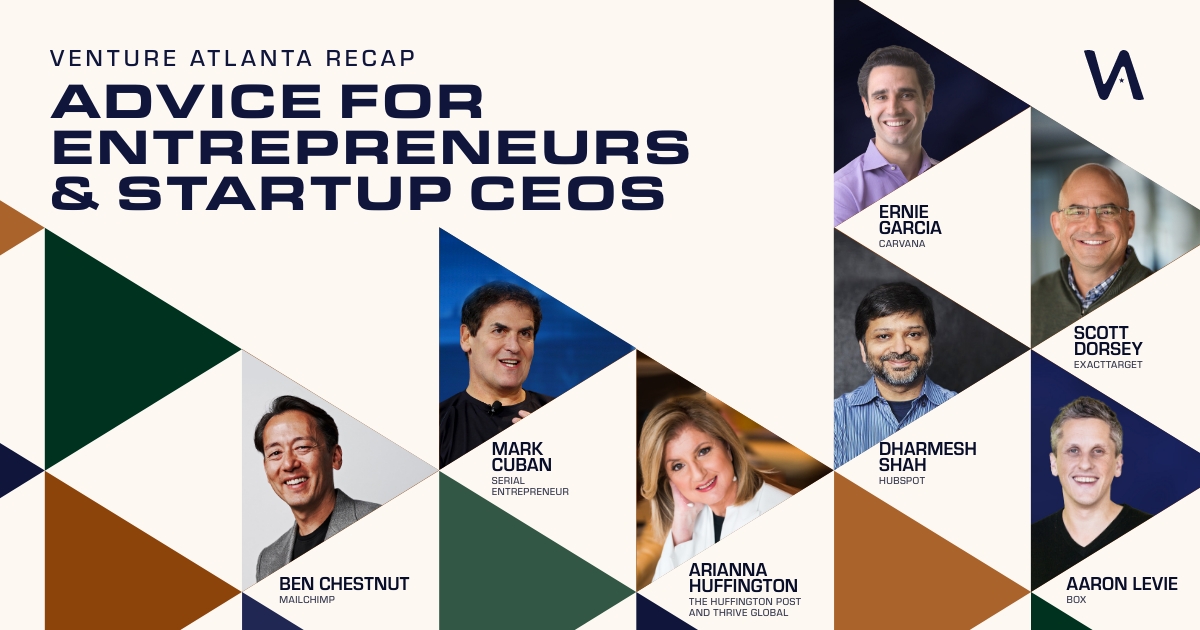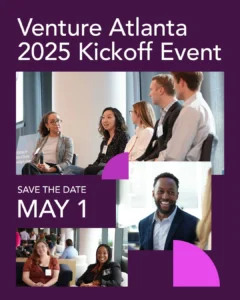For those seeking advice for entrepreneurs and startup CEOs, any internet search will yield pages upon pages of articles, blogs, tips, and guides—all claiming to help founders find success. But you shouldn’t necessarily take just any entrepreneur’s advice.
The best startup advice comes straight from the experts who’ve been there themselves: top-tier startup CEOs who know what it’s like to raise capital and complete successful exits; founders who overcome obstacles, continuously try (and often fail)—only to get back up and try, try again.
At Venture Atlanta, we’ve had the privilege and honor of having the best of the best, year after year, grace our stage as keynote speakers. Founders like Ernie Garcia, who started Carvana as a way to cut out the middleman and sell used cars directly to customers, and Arianna Huffington, who founded her own media company at the age of 54, generously share the invaluable knowledge and startup advice they’ve picked up throughout their tenure as some of the most successful and highly recognized entrepreneurs around the world.
In anticipation of the Venture Atlanta 2022 Keynote Speakers, we rounded up some of the top startup CEOs’ and entrepreneurs’ advice from past conferences. So sit back, relax, and skip the Google search—the best guidance is right here, at Venture Atlanta.
Ben Chestnut, CEO & Co-Founder, Mailchimp
Venture Atlanta 2021
Mailchimp’s CEO and Co-Founder, Ben Chestnut, shared more than some advice for entrepreneurs—he shared the story behind his decision to bootstrap, how he scaled the business, and lessons learned along the way.
“I started Mailchimp back in April 2000. In all humility, I think that decision to ‘bootstrap’ was made for me. That was the time of the dot com bust, so I got laid off. I started the company with the severance check that I got, and there was no investment money to be had. Even if I wanted it, I couldn’t get it.
We started as a web design agency. In 2007 we pivoted to MailChimp; by then, we were profitable. We were growing fast. SaaS was new—so to the few investors who flew over to Atlanta back then, I had to explain what SaaS was. I had to explain furthermore why we would build a SaaS company focused on small businesses. There’s no money in small business, we thought back then. Even if I wanted it, we wouldn’t be able to get investment money.”
Ben also revealed the value of having a large, homegrown company in Atlanta—and how that impacts the future growth of the ecosystem:
“There was no ecosystem at all [when we started]. Back then, 20 years ago, if you said you were starting up a tech company, people would say, ‘I’m so sorry. Oh, what would compel you to do that?’ It was kind of dismal for tech companies back then.
It was always on our minds; how can we build an ecosystem in Atlanta? My approach was that ecosystems are made of people, made of great, innovative, courageous leaders. I felt all that I could do to contribute was to build a great big company full of great leaders who could then someday go off and start their own companies. I’m seeing it thrive so much now. I wish we had something like this back then.”
Arianna Huffington, Founder, The Huffington Post & Thrive Global
Venture Atlanta 2020
Arianna Huffington was a successful journalist and author before launching The Huffington Post (now HuffPost) at the age of 54. In 2016, she embarked on a new venture with Thrive Global. Here’s the female entrepreneur’s advice to startup CEOs about raising capital (and breaking the mold).
“I started my first company at 54 and my second company at 66… I love reminding my friends who want to start companies that you don’t have to do it all in your 20s!
The first time around [raising], when I launched the Huffington Post, raising capital was much harder. My first round was friends… but because HuffPost had a successful legacy, it was much easier to raise capital the second time around, raising $65M in the last four years.”
Dharmesh Shah, Co-Founder & CTO, Hubspot
Venture Atlanta 2020
After the sale of his first startup, Dharmesh Shah wasn’t planning on starting another—in fact, he made the promise to his wife not to! But, like many serial entrepreneurs, he couldn’t resist the pull of his shared passion for SMB with Hubspot co-founder Brian Halligan.
Here’s what he had to say about where his inspiration comes from:
“I like to think of myself as a builder of things or a tinkerer… I like to fix inefficiencies. Those are the kinds of things that keep me up at night… What are those inefficiencies still left to be solved, and what can I do to help solve them?”
On advice for entrepreneurs:
“I would encourage entrepreneurs to [avoid going into] stealth mode. Everyone’s worried that someone is going to steal their ideas, but that almost never happens. There’s so much upside to getting those ideas out there… You will have this idea and you will start iterating this whole billionaire team and you’re going to spend the rest of your time convincing your team that the idea you’re actually pursuing is worth pursuing.”
Aaron Levie, CEO & Co-Founder, Box
Venture Atlanta 2019
Entrepreneur Aaron Levie revealed how he went about raising the first round of institutional capital:
“Between our sophomore and junior year of college, when we really started to take the business seriously, we were living and working in Seattle where we had grown up and we decided to go out and pursue some venture capital. So we did what anybody else would do. We looked up all the venture capitalists in the Seattle area and we cold-called every single one.
I remember we had one meeting where we went to the venture capitalist's office and then got this notification about 20 minutes into waiting in the lobby that the meeting was canceled for no apparent reason. We dealt with blow after blow. We did other things you’d expect. We dropped off a prospectus of our business model to Paul Allen’s house. He didn’t reach back out to us. We found the public fax number for Bill Gates’s office and sent him a fax of our prospectus. So that didn’t work also.
So basically all of the Seattle venture capitalists that were either professional venture capitalists or hobbyists in venture capital rejected us. I mean it made sense, we were 20 at the time going after the largest incumbents in the world with this online storage product. We finally got lucky—there was a group of private investors, some of which had been in venture capital prior, some had been in real estate, and so we raised $80,000 for the company, and we sold a quarter of the company.”
Ernie Garcia, CEO & Co-Founder, Carvana
Venture Atlanta 2017
When asked what startup advice he would give; particularly for those who might think they have the idea but are not sure how to go for it, Carvana’s CEO and Co-founder, Ernie Garcia, shared this insightful tidbit:
“The first thing I say is I think starting companies is a noble cause. I would encourage anyone who wants to do it because I think it's good for the world. A thought experiment I like to run is if you have a huge retailer with millions of customers who come to your store every day, you can put a pizza parlor in the back and serve mediocre pizza.
You’re going to sell pizza because people are already there, but if you’re a guy who wants to start a pizza company, and you’re going to be in a back alley somewhere because you can’t afford a better place, you have to blow people’s minds with your pizza or no one’s coming back again. That pressure that exists on startups forces you to build products that are better for the world. I think that’s really cool and noble and positive.”
Garcia went on to drop some knowledge when it comes to leading as a startup founder or CEO. Here’s the entrepreneur’s advice when it comes to being an effective leader:
“I think by far the most important thing to leadership is that you have a real cause. You need to have something that you can explain to people to get behind and feel good about. Having a good mission is just a prerequisite to good leadership in general.
When there’s a cause, people come together. I think a cause, hopefully, a positive one, is an important prerequisite. In the world of building a company and putting it out to a world of completely objective consumers, you face objective feedback that is just absolutely brutal. A really important part of that is making sure you have a really strong team around you and a really strong team that compliments your own weaknesses. So I think being aware of your weaknesses and acknowledging them is really important.”
Scott Dorsey, Co-Founder & Managing Partner, High Alpha and Former CEO, Salesforce ExactTarget
Venture Atlanta 2017
Entrepreneur, investor, and startup CEO advisor Scott Dorsey said:
“Business is all about one-to-one relationships. It’s all about caring about people in a really authentic and genuine way and communication is a really important part of that.”
Mark Cuban, Serial Entrepreneur
Venture Atlanta 2017
Entrepreneur, television personality (Shark Tank, anyone?), and media proprietor Mark Cuban has invested in too many companies to list. He graced our stage and offered the following advice for entrepreneurs regarding leadership style:
“If I start a company and I’m growing it, I have an all-in management style… [as an investor], my style really is to be supportive. If I invest in you, I trust you. I invest in you because I have high hopes for the company. I think there's something special about your organization. I think there's something good about you as an entrepreneur, but I want to keep updated so that I can help you.
My job is to help you solve problems. And so if there's something going wrong, that’s where I come in. And so I really tried to be hands-on as a problem solver, rather than micromanage and say, ‘Well, why aren't you doing this? Or why aren't you doing that?’ Because again, as entrepreneurs, you get to see firsthand what's working and not working.
The challenge I had in managing a lot of this is that we—as entrepreneurs and salespeople—lie to ourselves. We lie and say, ‘Oh, it's going great.’ Well, it’s not always as great as it should be. And so part of my challenge, other than just solving problems, is also trying to get my entrepreneurs to really be self-aware about their companies to know what's going right and what's going wrong because too many times we sugarcoat things. So, you know, I try to be supportive. I try to be aware and I try to be helpful.”
More Invaluable Advice For Entrepreneurs Awaits at Venture Atlanta 2022
Join us on Wednesday, October 19, and Thursday, October 20 for an exciting lineup of keynote speakers, pitch companies, and more. Spots are limited—register today!
Looking for more content from past conferences and startup advice for entrepreneurs and startup CEOs? Don’t forget to subscribe to our YouTube channel.


